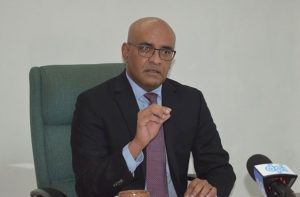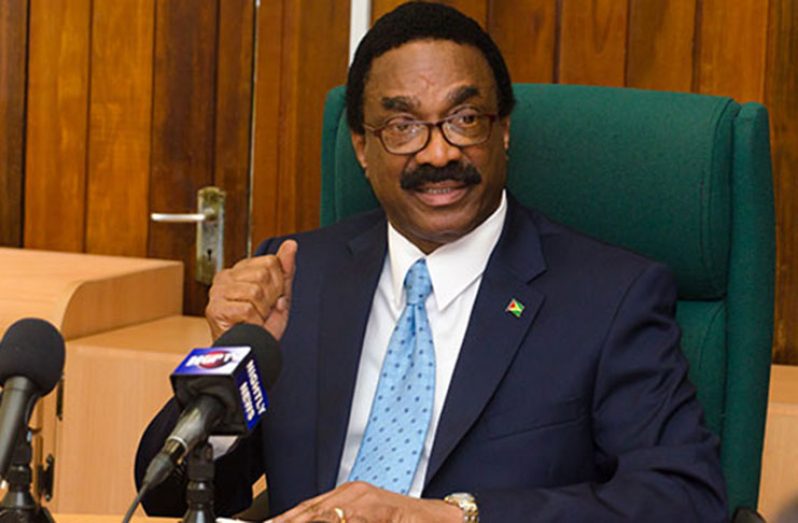THE Caribbean Court of Justice (CCJ) will this morning hear the appeal of the Attorney General of Guyana and Raphael Trotman against Cedric Richardson in the controversial third term case.
The case will be heard before the CCJ at 10:00am.
In a constitutional challenge Richardson, just before the May 2015 General and Regional Elections, contested the amendments made to Article 90 of the constitution that were enacted in 2000, following a bipartisan Constitutional Reform Process.
Article 90 (2) states that, “a person elected as President after the year 2000 is eligible for re-election only once.”
Richardson argued that the term limit infringes on Articles 1 and 9 of the constitution, wherein Article 1 states that “Guyana is an indivisible, secular, democratic, sovereign state in the course of transition from capitalism to socialism and shall be known as the Co-operative Republic of Guyana” and Article 9, states that “Sovereignty belongs to the people, who exercise it through their representatives and the democratic organs established by or under this constitution.”
Attorney General and Minister of Legal Affairs Basil Williams, the first-named appellant and former Speaker of the National Assembly, Raphael Trotman, the second-named appellant, had both argued that amendments made to Article 90 are not unconstitutional.
Williams along with Solicitor-General Kim Kyte-Thomas and Barbadian Queen’s Counsel, Ralph Thorne and Hal Gallop are appearing before the CCJ.
In July 2015, former Chief Justice Ian Chang ruled among other things, that the presidential term limit was unconstitutional without the approval of the people through a referendum. Justice Chang’s ruling prompted the attorney general and Trotman, the named parties, to appeal against the ruling.

Justice Chang had said Article No.17 of 2001 is without legal effect because it does not comply with other articles of the constitution dealing with repugnancy, democratic society and sovereignty belonging to the people, which require a referendum for any alteration.
He had reasoned that Articles 1 and 9 underpin the republican commitment to the fundamental concept of popular sovereignty or imperium populi, thereby safeguarding against elective despotism by the elected representatives of the people.
“Thus, while the constitution provides for representative democracy, such representative democracy cannot entrench on popular sovereignty from which it derives and which is entrenched by the requirement of the referendum,” Chang had said.
DILUTES RIGHTS OF CITIZENS
The former chief justice had determined that the two-term limit of presidents indeed dilutes the rights of citizens to elect the person they wish to govern their country regardless of the number of times they wish that person to be Head of State.
In his affidavit, Plaintiff Cedric Richardson had argued that the purported alteration of the constitution by Act 17 of 2001 would curtail or delimit the electorate’s choice of presidential candidate by rendering ineligible for the candidature any person who has been re-elected once as president, for example, former President Bharrat Jagdeo.
Meanwhile, in February 2017, the Court of Appeal by a two-one majority upheld the High Court ruling that the presidential term limit is unconstitutional and void.
Now retired, Chancellor of the Judiciary (ag) Carl Singh, and Justice BS Roy upheld Chang’s ruling, while acting Chief Justice (at the time) now Chancellor, Yonette Cummings-Edwards disagreed.
In her dissenting submission, Justice Cummings-Edwards said that Act #17 of 2000 did not require approval by referendum and noted that there is no dispute that it was validly passed.
NOT UNCONSTITUTIONAL
Secondly, insofar as Act No 17 of 2000 purported to amend article 90 of the constitution as the Honourable Chief Justice as he then was, said that amendment was not unconstitutional; the amendment was validly done.
Article 90 (2) and (3) prescribes that a person elected as president after the year 2000 is entitled to serve as president for only two terms. Article 90, insofar as it was amended by Act no 17 of 2000, did not either directly or indirectly alter or dilute or effect [sic], or amend Articles 1, and 9 of the constitution, Justice Cummings-Edwards stated.
She cited Article 1 of the constitution which states that Guyana is an indivisible, secular, sovereign state in the course of transition from capitalism to socialism and shall be known as the Cooperative Republic of Guyana.
The judge questioned which aspects of the amendments have affected the country’s indivisible, secular and democratic nature, as well as sovereignty by the imposition of a term limit of two terms to the presidency.
The Justice of Appeal also questioned what aspect of Guyana’s transition from capitalism to socialism and to be known as Cooperative Republic of Guyana, has been affected by imposing a term limit of two terms.
She posited that Article 9 provides that sovereignty belongs to the people who exercise it through their representatives and democratic organs established by or under this constitution. As such, it is the people who exercised their sovereignty through their representatives, Parliament and local democratic organs.
Justice Cummings-Edwards declared that Act No. 17 of 2000 was validly passed by way of two-thirds majority, it did not affect, either directly or indirectly, Articles 1 and 9 of the constitution and do not require a referendum.
She said the legislation is not unconstitutional and did not diminish the democratic right of the electorate in electing a person of their choice as president.
“I hold that Parliament acting intra vires the constitution by limiting the presidential term to two terms, I will therefore allow the appeal,” said Justice Cummings-Edwards in her ruling.
Meanwhile, Justice Singh in delivering his decision said laws which in effect will prevent citizens from their constitutional right to freely elect someone of their choice is unconstitutional. He submitted that the concepts of sovereignty and democracy are critical to the answering of that question and noted that the constitution must be interpreted in a broad, liberal, purposive and holistic way, so that the role of Guyanese citizens to exercise their democratic entitlement is properly interpreted.
The former chancellor said too that the provisions of Articles 1 and 9 of the constitution ought not to be “lightly regarded,” as they are deeply entrenched and provide substantive protection to the people of this country.
The effect of the amendment to Article 90, he posited, is to create further restrictions to the persons whom the people of Guyana could choose to elect as president, even though the people may consider any such restricted person suitable to be elected the president of Guyana.
As such, Justice Singh argued that before Act No.17 of 2000 was passed, those restrictions did not exist.




.jpg)










